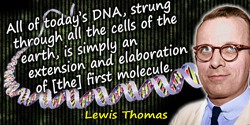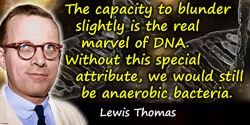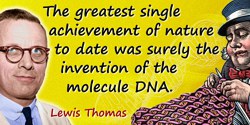 (source)
(source)
|
Lewis Thomas
(25 Nov 1913 - 3 Dec 1993)
American physician and author best known for his reflective essays on a wide range of topics in biology.
|
Lewis Thomas Quotes on New (9 quotes)
>> Click for 61 Science Quotes by Lewis Thomas
>> Click for Lewis Thomas Quotes on | Ant | DNA | Error | Gene | Knowledge | Language | Learning | Life | Mind | Nature | Science | Species | Truth | Universe |
>> Click for 61 Science Quotes by Lewis Thomas
>> Click for Lewis Thomas Quotes on | Ant | DNA | Error | Gene | Knowledge | Language | Learning | Life | Mind | Nature | Science | Species | Truth | Universe |
[We are] a fragile species, still new to the earth, … here only a few moments as evolutionary time is measured, … in real danger at the moment of leaving behind only a thin layer of of our fossils, radioactive at that.
— Lewis Thomas
The Fragile Species (1992, 1996), 25.
As evolutionary time is measured, we have only just turned up and have hardly had time to catch breath, still marveling at our thumbs, still learning to use the brand-new gift of language. Being so young, we can be excused all sorts of folly and can permit ourselves the hope that someday, as a species, we will begin to grow up.
— Lewis Thomas
From 'Introduction' written by Lewis Thomas for Horace Freeland Judson, The Search for Solutions (1980, 1987), xvii.
If we have learned anything at all in this century, it is that all new technologies will be put to use, sooner or later, for better or worse, as it is in our nature to do
— Lewis Thomas
In 'Autonomy', The Lives of a Cell: Notes of a Biology Watcher (1974), 79.
Long lives are not necessarily pleasurable…. We will be lucky if we can postpone the search for new technologies for a while, until we have discovered some satisfactory things to do with the extra time. Something will surely have to be found to take the place of sitting on the porch re-examining one’s watch.
— Lewis Thomas
In 'The Long Habit', The Lives of a Cell: Notes of a Biology Watcher (1974), 57.
Science is founded on uncertainty. Each time we learn something new and surprising, the astonishment comes with the realization that we were wrong before.
— Lewis Thomas
In 'On Science and Certainty', Discover Magazine (Oct 1980), 58.
The body of science is not, as it is sometimes thought, a huge coherent mass of facts, neatly arranged in sequence, each one attached to the next by a logical string. In truth, whenever we discover a new fact it involves the elimination of old ones. We are always, as it turns out, fundamentally in error.
— Lewis Thomas
In 'On Science and Certainty', Discover Magazine (Oct 1980)
The overwhelming astonishment, the queerest structure we know about so far in the whole universe, the greatest of all cosmological scientific puzzles, confounding all our efforts to comprehend it, is the earth. We are only now beginning to appreciate how strange and splendid it is, how it catches the breath, the loveliest object afloat around the sun, enclosed in its own blue bubble of atmosphere, manufacturing and breathing its own oxygen, fixing its own nitrogen from the air into its own soil, generating its own weather at the surface of its rain forests, constructing its own carapace from living parts: chalk cliffs, coral reefs, old fossils from earlier forms of life now covered by layers of new life meshed together around the globe, Troy upon Troy.
— Lewis Thomas
In Late Night Thoughts on Listening to Mahler’s Ninth Symphony (1984), 22-23.
We are at our human finest, dancing with our minds, when there are more choices than two. Sometimes there are ten, even twenty different ways to go, all but one bound to be wrong, and the richness of the selection in such situations can lift us onto totally new ground.
— Lewis Thomas
In The Medusa and the Snail: More Notes of a Biology Watcher (1974, 1979), 39.
We are profoundly ignorant about nature. Indeed, I regard this as the major discovery of the past hundred years of biology. It is, in its way, an illuminating piece of news.
— Lewis Thomas
Essay, 'The Hazards of Science', collected in The Medusa and the Snail: More Notes of a Biology Watcher (1979), 73.
See also:
- 25 Nov - short biography, births, deaths and events on date of Thomas's birth.
- The Lives of a Cell: Notes of a Biology Watcher, by Lewis Thomas. - book suggestion.
- Booklist for Lewis Thomas.



 In science it often happens that scientists say, 'You know that's a really good argument; my position is mistaken,' and then they would actually change their minds and you never hear that old view from them again. They really do it. It doesn't happen as often as it should, because scientists are human and change is sometimes painful. But it happens every day. I cannot recall the last time something like that happened in politics or religion.
(1987) --
In science it often happens that scientists say, 'You know that's a really good argument; my position is mistaken,' and then they would actually change their minds and you never hear that old view from them again. They really do it. It doesn't happen as often as it should, because scientists are human and change is sometimes painful. But it happens every day. I cannot recall the last time something like that happened in politics or religion.
(1987) -- 


